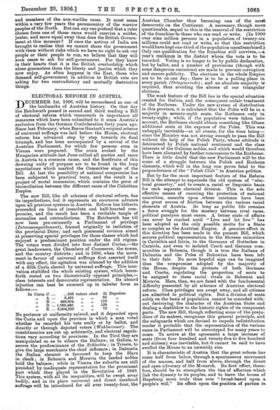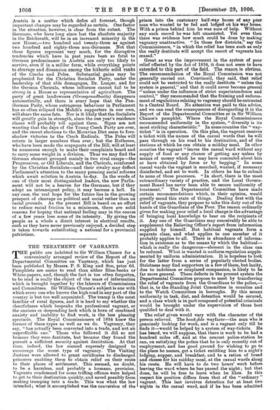ELECTORAL REFORM IN AUSTRIA.
DECEMBER 1st, 1906, will be remembered as one of the landmarks of Austrian history. On that day the Reichsrath passed in second and third reading a Bill of electoral reform which transcends in importance all measures which have been submitted to it since Austria's exclusion from the German Confederation forty years ago. Since last February, when Baron Gautsch's original scheme of universal suffrage was laid before the House, electoral reform has advanced step by step towards its final triumph, and has been accompanied by a revival of the Austrian Parliament, for which few persons even in Vienna were prepared. The crisis evoked by the Hungarian attitude last June rallied all parties and races in Austria to a common cause, and the firstfruits of this dawning unity of purpose are to be found in the .long negotiations which marked the Committee stage of the Bill. At last the possibility of national compromise has been subjected to practical tests, and the result is a project of mutal concession, which contains the germ of reconciliation between the different races of the Cisleithan Empire.
The new Bill, like all schemes of electoral reform, has its imperfections, but it represents an enormous advance upon all previous systems in Austria. Reform has hitherto proceeded on lines of irresolute and half-hearted com- promise, and the result has been a veritable tangle of anomalies and ccrntradictions. The Reichsrath has till now been pre-eminently a Parliament of privilege (Interessenparlament), framed originally in imitation of the provincial Diets ; and each piecemeal revision aimed at preserving special privileges for those classes which had enjoyed a predominant position under the old regime. The voters were divided into four distinct Curiae,—the great landowners, the Chambers of Commerce, the towns, and the country districts ; and in 1896, when the move- ment in favour of universal suffrage first asserted itself with any effect, the agitation was silenced by the addition of a fifth Curia elected by universal suffrage. This inno- vation stultified the whole existing system, which hence- forth rested on two diametrically opposed principles,— class interests and democratic representation. Its absurd injustice can best be summed up in tabular form as follows:— In Curia C _556 voters elect 21 Deputies.
6,431 „ „ 85 B ... 493,804 „ „ 118 D ... 1,585,466 „ „ 129 „
PP E ... 6,004,222 „ „ 72 „ No pretence at uniformity existed, and it depended upon the Curia and upon the province in which a man voted whether he recorded his vote orally or by ballot, and directly or through deputed -voters (Wahlmdnner). The constituencies are cut up arbitrarily, and electoral regula- tions vary according to provinces. In the Tirol they are manipulated so as to silence the Italians; in Galicia, to secure the predominance of the Schlachta ; in Trieste, to give the large merchants the chief influence ; in Dalmatia the Italian element is favoured to keep the Slays in check ; in Bohemia and Moravia the landed nobles hold the balance; while in Vienna the suburbs are still punished by inadequate representation for the prominent part which they played in the Revolution of 1848. This system, with all its inequalities, will be swept away bodily, and in its place universal and direct manhood suffrage will be introduced for all over twenty-four, the PP PP PP Austrian Chamber thus becoming one of the most democratic on the Continent. A necessary, though more questionable, sequel to this is the removal of the restriction of the franchise to those who can read or write. (In 1900 over nine million persons in a population of twenty-six millions could not read or write, so that this restriction would have kept one-third of the population unenfranchised.) Only one qualification for the franchise still survives,—a year's residence in the district where the rote is to be recorded. Voting is no longer to be by public declaration, but by ballot, and a number of provisions (though with some dangerous omissions) are made to prevent corruption and ensure publicity. The elections in the whole Empire are to be on one day ; there is to be a polling place in every parish (Ortsgemeinde); and an absolute majority is required, thus avoiding the abuses of our triangular elections.
The weak feature of the Bill lies in the special situation created for Galicia, and, the consequent unfair treatment of the Ruthenes. Under the new system of distribution in this province, it is calculated that the Poles will be in a majority in seventy-eight seats, the Ruthenes only in twenty-eight ; while, if the population were taken into account, the Ruthenes should obtain something like fifteen • additional seats at the expense of the Pole. This was unhappily inevitable—at all events, for the time being— since the Ministry was not strong enough to pass the Bill without the help of the Polish Party, whose attitude is determined by Polish national sentiment and the class interests of the Galician nobles, and which would therefore have been alienated by further concessions to the Ruthenes. There is little doubt that the new Parliament will be the scene of a struggle between the Polish and Ruthene elements, which will in the long run prove fatal to the preponderance of the "Polish Club" in Austrian politics.
But by far the most important feature of the Reform Bill is the attempt to supersede the old system of "elec- toral geometry,' and to create a racial or linguistic basis for each separate electoral division. This is the sole effective means of ensuring the protection of national minorities, assaults upon ,whose existence have been the great source of friction between the various racial elements of Austria. So long as public life remains a fierce struggle for the mastery between rival races, political paralysis must ensue. A better state of affairs can never be reached until "Live and let live" has been adopted as the only possible motto for a State so complex as the Austrian Empire. A genuine effort in this direction has been made in the present Bill, which secures political representation to the Slovene minorities in Carinthia and Istria, to the Germans of Gottschee in Carniola, and even to isolated Czech and German com- munities in Bohemia, though it is true the Italians of Dalmatia and the Poles of Bukowina have been left to their fate. No more hopeful sign can be imagined than the compromise adopted by the majority of the House, despite the protests of both Germans and Czechs, regulating the proportion of .seats to be assigned to these racial rivals in Bohemia and. Moravia. Here, then, we are faced with the fundamental diffioulty presented by all schemes of Austrian electoral reform. Class privileges are swept away, and all citizens are admitted to political rights. But a division of seats solely on the basis of population cannot be conceded with- out destroying the character of the Austrian State and dealing a deathblow to the historic rights of its component parts. The new Bill, though reflecting some of the preju- dices of its makers, recognises this general principle, and the safeguards which are devised to impede redistribution render it probable that the representation of the various races in Parliament will be stereotyped for many years to come. To arrive at the agreement a large increase of seats (from four hundred and twenty-five to five hundred and sixteen) was inevitable, but it cannot be said to have swelled the House to an unwieldy size.
It is characteristic of Austria that the great reform has come half from below, through a spontaneous movement of the masses, and half from above, through the direct and open advocacy of the Monarch. Its first effect, there- fore, should be to strengthen the ties of affection which link the dynasty to its peoples, and to leave the house of Hapsburg more truly than ever "broad-based upon a people's will." Its effect upon the position of parties in Austria it a matter which defies all forecast, though important changes may be regarded as certain. One factor iti the situation, however, is clear from the outset. The Germans, who have long since lost the absolute majority in the Reichsrath, will be in an increased Minority in the new House,—two hutdred and twenty-three as against two hundred and eighty-three non-Germain. Not that these figures represent very much, for the disruptive tendencies which have in past years beett so fatal to German predominance in Austria are only too likely to survive, even if in a milder form, while everything points to cleavage and dissension among the hitherto solid ranks of the Czechs and Poles. Substantial gains may be prophesied for the Christian Socialist Party, under the leadership of that able demagogue, Dr. Lueger, Mid for the German Clericals, whose influence cannot fail to be strong in a House so representative of agriculture. The party of great landowners (Grossgrundbesitz) disappears automatically, and there is every hope that the Pan- German Party, whose outrageous behaviour in Parliament has so often eclipsed the Mahdi's supporters in our own, will share the same fate. Nor is it likely that the Socialists will greatly gain in strength, since the one year's residence clause will probably tell against them. Signs are not wanting that the days of the Young Czech Party are over, and the recent elections to the Moravian Diet seem to fore- shadow victories to the Czech Radicals. The Poles will return in larger numbers than ever ; but the Ruthenes, who have been made the scapegoats of the Bill, will at least be numerous enough to make their complaints heard and to carry some weight in a division. Thus we may find the German element grouped mainly- in t190 rival camps—the Progressives, or Old Liberals, and the Clericals, reinforced by the Christian Socialists—and their rivalry may deflect Parliament's attention to the many pressing social reforms which await solution in Austria to-day. In the words of one of their most distinguished leaders, the new Parlia- ment will not be a heaven for the Germans, but if they adopt an intransigent policy, it may become a hell. In any case, the real hope for the future lies in the growing prospect of cleavage on political and social rather than on racial grounds. As the present Bill is based on an effort to reduce racial friction to a minimum, there are solid reasons for hoping that national feeling may in the course of a few years lose some of its intensity. By giving the people as a whole a direet interest in eleotoral results, such as they have never previously enjoyed, a decided step is taken towards substituting a national for a provincial patriotism.



































 Previous page
Previous page